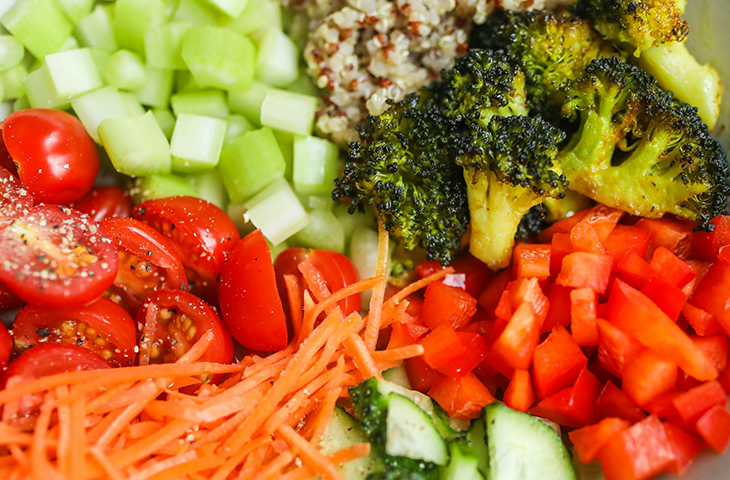Now’s Not The Time To Eat Bagged Lettuce

When you think of food poisoning, perhaps what first comes to mind is undercooked chicken, spoiled milk, or oysters. Personally, I remember the time I devoured a sushi boat as a high-school senior and found myself calling for my mommy in the early hours of the morning.
But don’t overlook your vegetable crisper. In terms of foodborne illness, leafy greens stand alone. In 2022, they were identified as the cause of five separate multistate foodborne-illness outbreaks, more than any other food. Romaine lettuce has a particularly bad reputation, and for good reason. In 2018, tainted romaine killed five people and induced kidney failure in another 27. Last year, an E. coli outbreak tied to—you guessed it—romaine sent 36 people to the hospital across 15 states. Perhaps ironically, the bags of shredded lettuce that promise to be pre-washed and ready to eat are riskier than whole heads of romaine.
Eating romaine lettuce is especially a gamble right now. Although America’s system for tracking and responding to foodborne illnesses has been woefully neglected for decades, it has recently been further undermined. The Biden administration cut funding for food inspections, and the Trump White House’s attempts to ruthlessly thin the federal workforce has made the future of food safety even murkier. The system faces so many stressors, food-safety experts told me, that regulators may miss cases of foodborne illness, giving Americans a false sense of security. If there’s one thing you can do right now to help protect yourself, it’s this: swearing off bagged, prechopped lettuce.
Americans aren’t suddenly falling sick en masse from romaine lettuce, or anything else. “There’s just millions of these bags that go out with no problem,” David Acheson, a former FDA food-safety official who now advises food companies (including lettuce producers), told me. But what’s most disturbing of late is the government’s lackadaisical approach to alerting the public of potential threats. Consider the romaine-lettuce outbreak last year. Americans became aware of the outbreak only last month, when NBC News obtained an internal report from the FDA. The agency reportedly did not publicize the outbreak or release the names of the companies that produced the lettuce because the threat was over by the time the FDA determined the cause. The rationale almost seems reasonable—until you realize that Americans can’t determine what foods are, or aren’t, safe without knowing just how often they make people sick. (A spokesperson for the FDA didn’t respond to a request for comment.)
In that information void, forgoing bagged lettuce is a bit like wearing a seat belt. In the same way that you likely don’t entirely avoid riding in a car because of the risk of an accident, it’s unnecessary to swear off all romaine because it could one day make you sick. Lettuce and other leafy greens are full of nutrients, and abandoning them is not a win for your health. That doesn’t mean, however, that you shouldn’t practice harm reduction. Buying whole heads of lettuce might just be the life hack that keeps you from hacking up your Caesar salad.
Bagged lettuce ups the odds of getting a tainted product. When you buy a single head of lettuce, you’re making a bet that that exact crop hasn’t been infected. But the process of making prechopped lettuce essentially entails putting whole heads through a wood chipper. Once a single infected head enters that machine, the pieces of the infected lettuce stick around, and it’s likely that subsequent heads will become infected. “Buying a head of romaine lettuce is like taking a bath with your significant other; buying a bag of romaine lettuce is like swimming in a swimming pool in Las Vegas,” Bill Marler, a food-safety lawyer, told me.
There’s also some evidence that chopping romaine makes the lettuce more susceptible to pathogens. One study that tested the growth of E. coli on purposefully infected romaine found that within four hours of cutting the lettuce into large chunks, the amount of E. coli on the plant increased more than twice as much as on the uncut lettuce. Shredding the lettuce was even worse; the E. coli on that plant increased elevenfold over the same time period. The theory for why this occurs is similar to the reason cuts make people more susceptible to infection; essentially, cutting romaine breaks the outer protective layer of the lettuce, making it easier for bacteria to proliferate. (This experiment was done in relatively hot temperatures, so your chopped lettuce is likely safer if you keep it refrigerated. But the convenience of pre-shredded lettuce still comes with yet another additional risk.)
[Read: The dilemma at the center of McDonald’s E. Coli outbreak]
And no, washing your bagged lettuce rigorously is not the answer. If it’s infected, only a thorough cooking is going to kill the bacteria and protect you from getting sick. Rinsing your vegetables is “a mitigation step that’s reducing risk, but it is not a guarantee,” Benjamin Chapman, a food-safety expert at North Carolina State University, told me. Buying whole heads of lettuce is an imperfect solution to a major problem, but it’s the best thing consumers can do as regulators have continued to drop the ball on food safety. A lot of lettuce is contaminated by irrigation water that comes from nearby feedlots, and yet it has taken the FDA a decade to enforce water-quality standards for most crops. The FDA has also continually fallen behind on its own inspection goals. A January report from the Government Accountability Office, the government’s internal watchdog, found that the FDA has consistently missed its targets for conducting routine food inspections since 2018.
Politicians of both parties have seemed content to make cuts to an already overstressed system. Late last year, the Biden administration announced that it was cutting $34 million in funding to states to carry out routine inspections of farms and factories on behalf of the FDA, reportedly because the agency’s budget needed to make up for inflation. And under Health and Human Services Secretary Robert F. Kennedy Jr., the FDA is now making steep funding and staff cuts. Although the Trump administration has claimed that no actual food inspectors will be laid off as a result of government downsizing, there’s already evidence that the moves will, in fact, make it harder for the government to respond when illnesses strike. Spending freezes and cuts to administrative staff have reportedly made it more difficult for FDA inspectors to travel to farms, and for them to purchase sample products in grocery stores for testing. A committee tasked with exploring a range of food-safety questions, including probing what strains of E. coli cause bloody diarrhea and kidney failure, has been shut down, and a key food-safety lab in San Francisco has been hit with wide-scale layoffs, according to The New York Times. (Employees at the San Francisco lab told me that they are now being hired back.)
Skipping prechopped bagged lettuce might sound like neurotic advice, but a leafy-green outbreak is almost guaranteed to occur in the coming months. One seems to happen every fall, and it’ll be up to RFK Jr. to respond. Although Kennedy has promised to foster a culture of radical transparency at the federal health agencies, his first months on the job haven’t been reassuring. The staff at the FDA’s main communications department—employees typically tasked with briefing national news outlets during outbreaks—have been fired. So have staff at public-record offices. Government updates on the ongoing bird-flu outbreak have virtually stopped. It’s reasonable to assume that the Trump administration will take a similar “see no evil, hear no evil, speak no evil” approach to foods that can make us sick.
“I’m really worried that we are going to see the number of outbreaks, and the number of illnesses, go down—and it has nothing to do with the safety of the food supply,” Barbara Kowalcyk, the director of the Institute for Food Safety and Nutrition Security at George Washington University, told me. “It just means if you don’t look for something, you don’t find it.” With so much uncertainty about food safety, busting out a knife and chopping some lettuce beats a trip to the hospital, or a night hugging the toilet.


